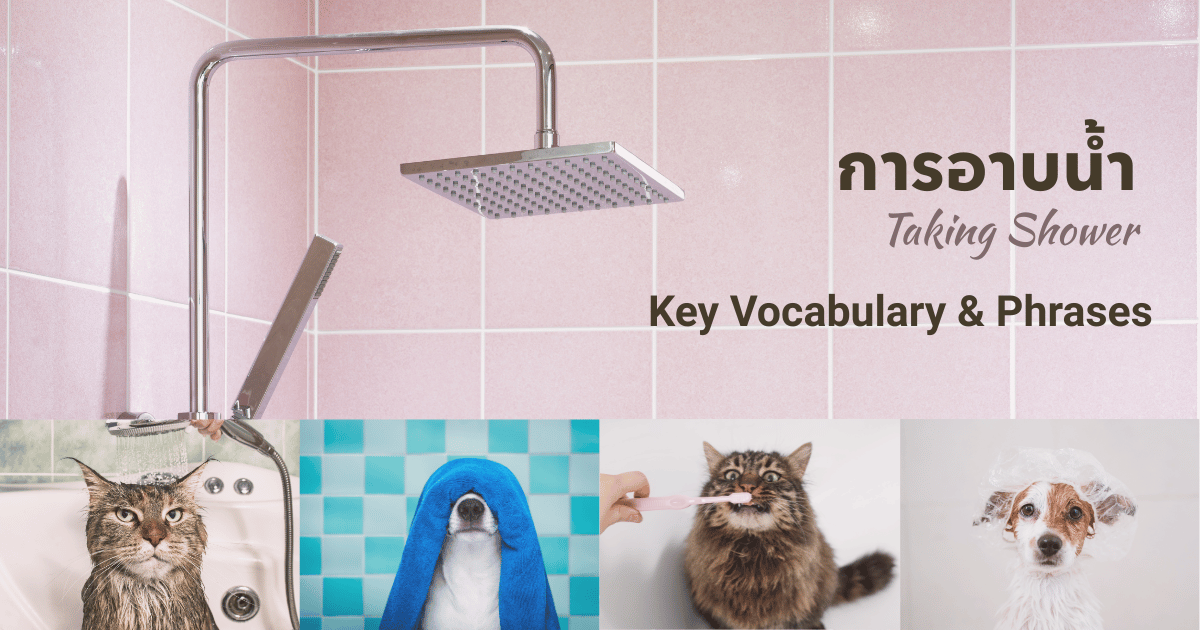In today’s blog post, we’re diving into a topic we all experience every day: การอาบน้ำ (kaan-ʔàap-náam)–taking a shower in Thai. This was also the theme of this month’s podcast episode (#001 การอาบน้ำ– Taking Shower), so if you’ve listened to that, you’ll already have some great context!
In Thai, many useful words and phrases can help you discuss your shower habits in detail.
But before we learn more words related to this topic, I need to clarify the word shower in Thai.
When we say อาบน้ำ (ʔàap náam), we mean we clean our body with water, and it doesn’t matter which way. It can be to shower, bathe, wash ourselves in a river, etc.
But if you want to talk about a shower or a showerhead, you should refer to it as ฝักบัว (fàk-bua). Do you know why we call this ฝักบัว (fàk-bua)?
ฝักบัว (fàk-bua) means a lotus pod, and we think a shower looks like a lotus pod. Therefore, we call it so!


Now, let’s take a closer look at some key vocabulary and example sentences that will help you sound more natural and confident when talking about taking a shower in Thai!
Vocabulary List & Example Sentences
1. แปรงสีฟัน (prææŋ-sǐi-fan)– toothbrush

- ฉันจะไปซื้อแปรงสีฟันที่เซเว่น-อีเลฟเว่น
- chán ca pay sɨ́ɨ prææŋ-sǐi-fan thîi 7-11.
- I will go buy a toothbrush at 7-11.
I say this sentence quite often when I travel to other places in Thailand. I, many times, forgot to bring my toothbrush. Now, there are pretty many แปรงสีฟัน (prææŋ-sǐi-fan) in my house.
2. แปรงฟัน (prææŋ-fan)– to brush teeth

- ผมแปรงฟันเช้าเย็น
- phǒm prææŋ-fan cháaw yen.
- I brush my teeth in the morning and evening.
3. ยาสีฟัน (yaa-sǐi-fan)– toothpaste

- ตอนเป็นเด็กฉันชอบกินยาสีฟัน
- tɔɔn pen dèk, chán chɔ̂ɔp kin yaa-sǐi-fan.
- When I was a kid, I liked eating my toothpaste.
Well, I think kid’s toothpaste has quite a good taste.
4. สบู่ (sabùu)– soap

- โรงแรมนี้ไม่มีสบู่
- rooŋ-rææm níi mây mii sabùu.
- This hotel does not have soaps.
There are two different types of soap: สบู่เหลว (sabùu lěew)– liquid soap and สบู่ก้อน (sabùu kɔ̂ɔn)– bar soap.
5. ยาสระผม (yaa-sà-phǒm)– shampoo

- คุณใช้ยาสระผมยี่ห้ออะไร
- khun cháy yaa-sà-phǒm yîi-hɔ̂ɔ ʔaray.
- What brand of shampoo do you use?
This can be a common question among women. If we see friends who have healthy hair, we ask this question so we may try using that brand. It also works for a man who wants to compliment a woman with healthy, beautiful hair.
| Man:
| คุณใช้ยาสระผมยี่ห้ออะไรเหรอครับ (khun cháy yaa-sà-phǒm yîi-hɔ̂ɔ ʔaray rə̌ə khráp.) Which shampoo’s brand do you use? |
| Woman:
| ยี่ห้อปัญญ์ปุริค่ะ ทำไมเหรอคะ (yîi-hɔ̂ɔ Panpurí khâ. thammay rə̌ə khá.) Panpuri brand. Why? |
| Man:
| อ๋อ ไม่มีอะไรครับ แค่ผมคุณสวยมาก (ʔɔ̌ɔ mây-mii-ʔaray khráp. khæ̂æ phǒm khun sǔay mâak.) Oh, nothing. It’s just your hair is beautiful. |
Note: Nowadays, it’s also common for Thai people to use the word แชมพู (chæmphuu)—shampoo instead of the actual Thai term.
6. สระผม (sà-phǒm)– to wash hair

- ฉันสระผมทุกเย็นช่วงหน้าร้อน
- chán sà-phǒm thúk yen chûaŋ nâa-rɔ́ɔn.
- I wash my hair every evening during summer.
7. ครีมนวดผม (khriim-nûat-phǒm)– conditioner

- ปกติผมไม่ใช้ครีมนวดผม
- pòkkatì phǒm mây cháy khriim-nûat-phǒm.
- Normally, I don’t use hair conditioners.
The direct translation of ครีมนวดผม (khriim-nûat-phǒm) is a cream to massage hair.
- ครีม (khriim)– cream
- นวด (nûat)– to massage
- ผม (phǒm)– hair
Note: Thai people also shorten it into ครีมนวด (khriim-nûat).
8. ผ้าเช็ดตัว (phâa-chét-tua)– towel

- ช่วยเปลี่ยนผ้าเช็ดตัวให้ด้วยนะครับ
- chûay plìan phâa-chét-tua hây dûay ná khráp.
- Please change a new towel for me as well.
You can use this sentence with a housekeeper at a hotel or a place you stay. The direct translation of this word is a cloth to wipe the body.
- ผ้า (phâa)– a cloth
- เช็ด (chét)– to wipe
- ตัว (tua)– body
9. น้ำเย็น (náam yen)– cold water
- ฉันอาบน้ำเย็นตอนเช้า
- chán ʔàap náam yen tɔɔn cháaw.
- I take a cold water shower in the morning.
10. น้ำอุ่น (náam ʔùn)– warm water
- วันนี้อาบน้ำอุ่นเพราะอากาศหนาว
- wan-níi ʔàap náam ʔùn phrɔ́ ʔaakàat nǎaw.
- Today, I took a warm water shower because the weather is cold.
11. ก๊อกน้ำ (kɔ́k-náam)– faucet / tap

- ที่ประเทศไทยกินน้ำจากก๊อก(น้ำ)ไม่ได้
- thîi prathêet Thai, kin náam càak kɔ́k-(náam) mây dâay.
- In Thailand, you cannot drink water from a tap.
Note: Thai people shorten ก๊อกน้ำ (kɔ́k-náam) into ก๊อก (kɔ́k).
12. อ่างอาบน้ำ (ʔàaŋ-ʔàap-náam)– bathtub

- ฉันชอบแช่น้ำในอ่างอาบน้ำ
- chán chɔ̂ɔp chæ̂æ náam nay ʔàaŋ-ʔàap-náam.
- I like to soak in the bathtub.
Note: The word อ่าง (ʔàaŋ) is used to call a container used to hold water. Therefore, อ่างอาบน้ำ (ʔàaŋ-ʔàap-náam) means a container with water for washing yourself.
13. อ่างล้างหน้า (ʔàaŋ-láaŋ-nâa)– sink

- เราอยากเปลี่ยนอ่างล้างหน้าใหม่
- raw yàak plìan ʔàaŋ-láaŋ-nâa mày.
- We want to change a new sink.
The direct translation of this word is a basin to wash the face.
- อ่าง (ʔàaŋ) – a water basin
- ล้าง (láaŋ) – to wash
- หน้า (nâa) – face
Sometimes, you may hear people refer to it as อ่างล้างมือ (ʔàaŋ-láaŋ-mɨɨ), which literally means a basin to wash hands.
14. กะละมัง (kalamaŋ)– basin

Initially, this term was used to describe a container made of enameled metal. However, since I can remember things, I have known กะละมัง (kalamaŋ) as a round container (can be of enameled metal or plastic) mainly used as a water basin in a bathroom for washing ourselves, and another use is for washing clothes. However, it can be used for several purposes.
You may hear Thai people shorten it into กะมัง (kamaŋ).
15. ชักโครก (chák-khrôok)– toilet

- ผมอยากเปลี่ยนห้อง เพราะชักโครกเสีย
- phǒm yàak plìan hɔ̂ŋ phrɔ́ chák-khrôok sǐa.
- I want to change the room because the toilet doesn’t work.
You may have learned the word ห้องน้ำ (hɔ̂ŋ-náam) as a word for a toilet. You should have seen it in a sentence like ห้องน้ำอยู่ที่ไหน (hɔ̂ŋ-náam yùu thîi-nǎy)– Where is the toilet?
But ห้องน้ำ (hɔ̂ŋ-náam) only means a bathroom or restroom. Its direct translation is a water room.
16. สายฉีดชำระ (sǎay-chìit-chamrá)– bidet spray

- ห้องน้ำส่วนใหญ่ในประเทศไทยมีสายฉีดชำระ
- hɔ̂ŋ-náam sùan-yày nay prathêet Thai mii sǎay-chìit-chamrá.
- Most of the restrooms in Thailand have bidet sprays.
สายฉีดชำระ (sǎay-chìit-chamrá) is an official term. In casual talk, we say สายฉีดก้น (sǎay-chìit-kôn) or สายฉีดตูด (sǎay-chìit-tùut) which literally mean a hose to spray butt.
- สาย (sǎay)– hose
- ฉีด (chìit)– to spray
- ก้น/ตูด (kôn/tùut)– butt
Note: ก้น (kôn) is a more neutral standard word for butt. ตูด (tùut) is more colloquial and a bit cruder. However, with friends and family, we commonly use ตูด (tùut).
Conclusion
You’ve got several Thai words and example sentences to help you confidently chat about your shower routine. Remember that practicing everyday things like showering is a great way to boost your vocabulary.
If you haven’t already, make sure to check out our podcast episode about taking a shower!

